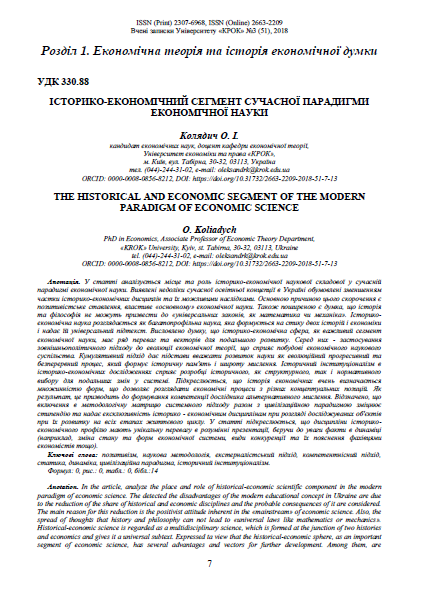THE HISTORICAL AND ECONOMIC SEGMENT OF THE MODERN PARADIGM OF ECONOMIC SCIENCE
DOI:
https://doi.org/10.31732/2663-2209-2018-51-7-13Keywords:
positivism, scientific methodology, externalist approach, competence approach, statics, dynamics, civilizational paradigm, historical institutionalismAbstract
In the article, analyze the place and role of historical-economic scientific component in the modern paradigm of economic science. The detected the disadvantages of the modern educational concept in Ukraine are due to the reduction of the share of historical and economic disciplines and the probable consequences of it are considered. The main reason for this reduction is the positivist attitude inherent in the «mainstream» of economic science. Also, the spread of thoughts that history and philosophy can not lead to «universal laws like mathematics or mechanics». Historical-economic science is regarded as a multidisciplinary science, which is formed at the junction of two histories and economics and gives it a universal subtext. Expressed ta view that the historical-economic sphere, as an important segment of economic science, has several advantages and vectors for further development. Among them, are application of the externalist approach to the evolution of economic theory, which contributes to the construction of economic science society. The cumulative approach provides grounds for considering the development of science as an evolutionary progressive and continuous process that shapes historical memory and the breadth of thinking. Historical institutionalism in historical and economic research contributes to designing a historical choice, both structural and normative, for further changes to the system. It is emphasized that the history of economic doctrines is determined by the plurality of forms, which makes it's possible to consider economic processes from differents conceptual positions. As a result, this leads to the formation of the competence of the researcher of alternative thinking. It is marked that the inclusion in the methodological matrix of the system approach along with the civilizational paradigm strengthens the scholarship and gives exclusivity to historical - economic disciplines when considering the objects under study in their development at all stages of the life cycle. The article emphasizes that the disciplines of the historical - economic profile have a unique advantage in understanding the presentation, considering the facts in the dynamics (for example, the change of the state and forms of the economic system, the types of competition and their explanation by specialists of economists, etc.).
Downloads
References
Henderson W., Samuels W. J. (2004). The etiology of Adam Smith's division of labor: alternative accounts and Smith's methodology applied to them. In: W. J. Samuels, W. Henderson, K. D. Johnson, M. Johnson (eds.). Essays on the history of economics. London; N.Y.: Routledge, pp. 8-71.
Mirowski Ph. (2012) Physics and the «marginal revolution». Terra Economicus, Vol. 10, № 1, pp. 100 — 116.
McLure M. (2001). Pareto, economics and society: the mechanical analogy. L.: Routledge.
McCloskey D. N. (1998). The rhetoric of economics. Madison: University of Wisconsin Press.
Weintraub E. R. (2012). Telling the story of MIT economics in the 1940s. Unpublished manuscript. Durham: Duke University, October 8. URL http://public.econ.duke. edu/~erw/190/MIT-Contexts-Berlin.pdf (дата зверненння 07.08.2018).
Blaug M. (2001). No history of ideas, please, we're economists. Journal of Economic Perspectives, Vol. 15, pp. 145 — 164.
Backhouse R. (2006). Economics, Sociology of. In: J. Beckert, M. Zafirovski (eds.). International encyclopedia of economic sociology. London; N.Y.: Routledge, pp. 216-221.
Caldwell B. (2013). On positivism and the history of economic thought. Southern Economic Journal, Vol. 79, № 4, pp. 753—767.
Полтерович В. M. Становление общего социального анализа. Общественные науки и современность : журнал. 2011 № 2. С. 101 — 111.
Szenberg M., Ramrattan L., Gottesmann A. A. (2006). Introduction: The Significance of Paul Samuelson in the Twenty First Century. In: M. Szenberg, L. Ramrattan, A. A. Gottesmann (eds.). Samuelsonian Economics and the Twenty-First Century. Oxford: Oxford University Press.
Emmett R. B. (ed.). (1999). Selected essays by F. Knight. Vol. 1. Chicago; London: University of Chicago Press.
Мальцев А. А. История экономических учений. Экономическая теория в историческом развитии. Взгляд из Франции и России : монография. Москва, 2016. 668 с.
Шумпетер Й. А. История экономического анализа: науч. пособие. Москва : Экономическая школа, 2001. С. 66.
Січевлюк Л. В. Нарис історії економічної думки України кінця ХІХ – початку ХХ ст. в особистостях : навчальний посібник. Київ : Університет економіки та права «КРОК», 2018. 256 с.


